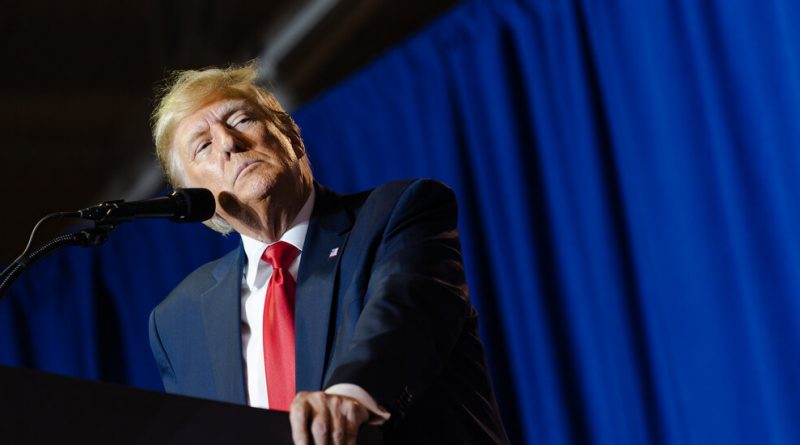Here are some of the charges Trump faces.
A grand jury has charged former President Donald J. Trump with a total of seven counts, according to two people familiar with the indictment.
While the precise details of all the charges are not yet clear, the people familiar with the matter said the charges include willfully retaining national defense secrets in violation of the Espionage Act, conspiracy to obstruct justice, and making false statements.
Here is a closer look.
Unauthorized retention of national security documents
It is a crime to retain national security documents without authorization and to fail to deliver them to a government official entitled to take custody of them.
To win a conviction, prosecutors would have to show that Mr. Trump knew he was still in possession of the documents after leaving the White House and failed to comply when the government asked him to return them and then subpoenaed him.
Each such charged document would be a separate offense, so it is possible that prosecutors have brought as many as five counts of this offense by citing five different records. A conviction would be theoretically subject to 10 years in prison for each count, although defendants in other Espionage Act cases have received significantly less than the maximum.
To obtain a conviction, prosecutors would also have to prove to the jury that the documents related to the national defense, that they were closely held and that their disclosure could harm the United States or aid a foreign adversary.
Although Mr. Trump has claimed — without evidence — that he declassified all the files he took to Mar-a-Lago, prosecutors would not technically need to prove that they were still classified because the Espionage Act predates the classification system and does not refer to it as an element.
Conspiracy Charges
It is a crime to agree with another person to break a law. Prosecutors would need to show that Mr. Trump and some other person had a meeting of the minds about committing a specific crime and that one of them took some step toward that goal. The penalty can be up to five years.
Obstruction
It is a crime to conceal records to obstruct an official effort. Prosecutors would need to show several things, including that Mr. Trump knew he still had files that were subject to the efforts by the National Archives and Records Administration to take custody of presidential records. They would also need to be able to demonstrate that he willfully defied the Justice Department’s subpoena for files marked as classified, and that he intentionally caused his subordinates to fail to turn them all over while leading officials to believe they had complied. The penalty is up to 20 years per offense.
False statement
It is a crime to make a false statement to a law enforcement officer about a fact material to the officer’s investigation. Such crimes carry a penalty of up to five years per offense.
Mr. Trump is not known to have directly made substantive statements to the government, but prosecutors could charge him if they can show that he conspired with or induced another person to lie to the Justice Department about there being no further documents responsive to the subpoena.
Or, if prosecutors can show that he induced his lawyers to unwittingly lie to the Justice Department, they could charge Mr. Trump directly for causing the false statement even if he himself did not commit the offense himself. The law says that “whoever willfully causes an act to be done which if directly performed by him or another would be an offense against the United States, is punishable as a principal.”
It is not known what the other charges are, but here are some possibilities:
Mishandling official documents
Whether or not the documents relate to national security, it is a crime to conceal or destroy official documents. Among other disclosures, former aides to Mr. Trump have recounted how he sometimes ripped up official documents. The National Archives has also said that some of the White House paper records the Trump administration transferred to it had been torn up, including some that had been taped back together. The penalty is up to three years per offense, in addition to a ban on holding federal office, although the latter is most likely unconstitutional, legal experts say.
Contempt of court
It is a crime to willfully disobey a court order, like the grand jury subpoena Mr. Trump received in May 2022 that required him to turn over all documents marked as classified that remained in his possession. It carries a penalty of a fine of up to $1,000 and up to six months in prison. To bring this charge, prosecutors would need evidence showing he knew that he was still holding onto other files with classification markings during and after his representatives purported to comply with the subpoena.
Charlie Savage is a Washington-based national security and legal policy correspondent. A recipient of the Pulitzer Prize, he previously worked at The Boston Globe and The Miami Herald. His most recent book is “Power Wars: The Relentless Rise of Presidential Authority and Secrecy.” @charlie_savage • Facebook
Source: Read Full Article

